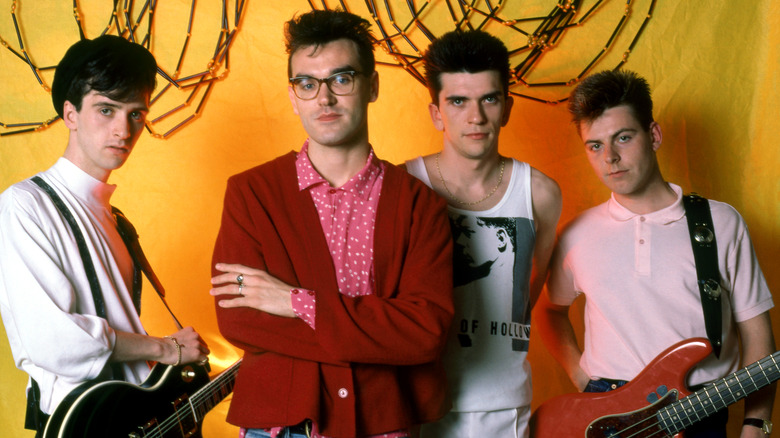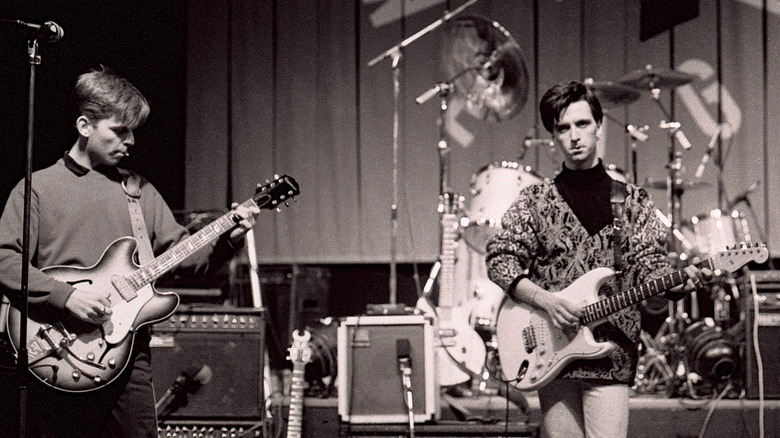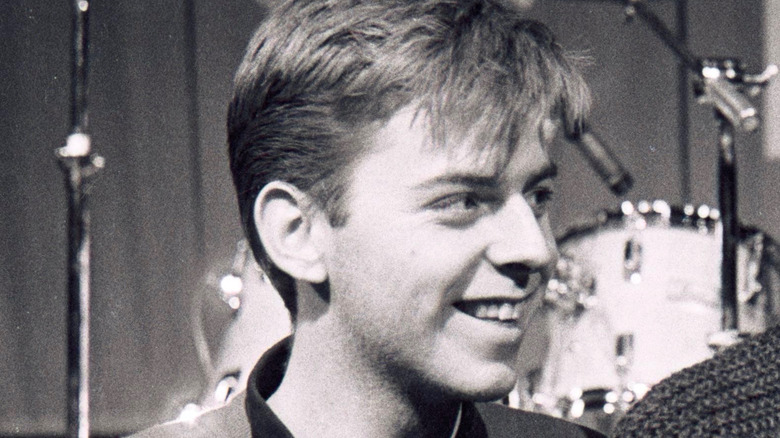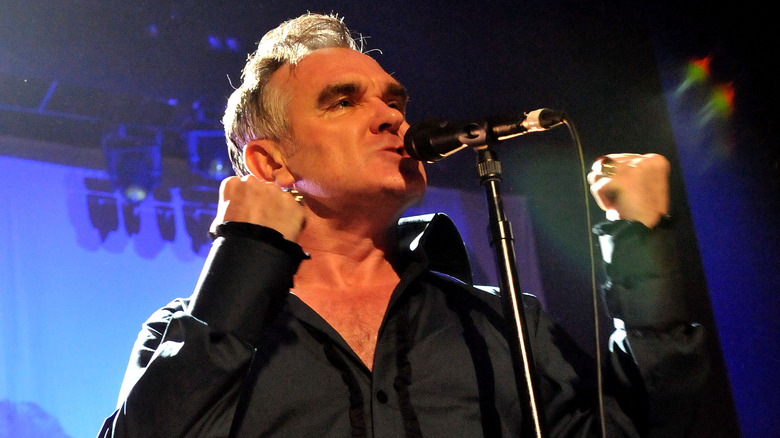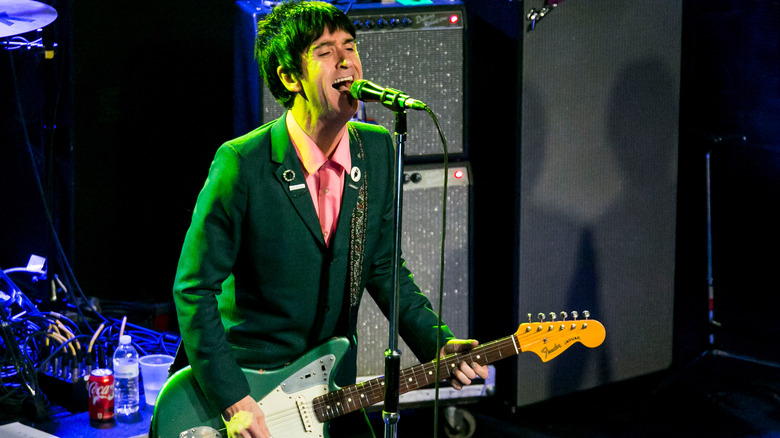Tragic Details About The Smiths
Led by frontman Morrissey and guitarist Johnny Marr, the Smiths emerged out of Manchester in 1982 and quickly became standard-bearers of 1980s British rock. Although they were arguably a niche act outside of the United Kingdom at a time when rock music was mostly about hairspray and spandex, they proved to be highly influential to scores of bands that followed in their footsteps, particularly those in the alternative and indie sub-genres of rock. Unfortunately, they disbanded just five years after forming, but not before releasing four full-length albums and dozens of mostly successful singles.
Given their penchant and reputation for writing gloomy music, it probably wouldn't surprise anyone that the Smiths went through a lot of trials and tribulations during their short time together, and even in the years that followed. In fact, there's far more to their origin story than Marr and Morrissey first meeting in the late '70s at a Patti Smith concert and forming a band a few years later. It would take months before they settled on a fixed lineup, and that's where we shall be starting our rundown of some of the more tragic — or at least challenging — details about the Smiths and the men who made up the band.
They went through several early lineup changes
While it isn't necessarily tragic for a band to have a hard time coming up with a permanent lineup of musicians, it can be quite stressful, to say little of having to adjust to the presence of a new member or two onstage or in the studio. At the time of their formation in 1982, the still-unnamed Smiths were made up of Steven Morrissey on vocals (before he decided to stop using his first name), Johnny Marr on guitar, and a third member, rhythm guitarist Steve Pomfret. As noted by iNostalgia, Pomfret didn't stick around for long and was soon replaced by bassist Dale Hibbert. Meanwhile, drummer Simon Wolstencroft played on a few demo recordings before Mike Joyce stepped in as the Smiths' permanent drummer. For what it's worth, at least they didn't have to go through a plethora of drummers like (the much heavier) Judas Priest so infamously did.
Similar to Pomfret and Woltenscroft, Hibbert's stint was a quick one, as Marr's friend Andy Rourke took his place as the Smiths' bassist soon after their October 1982 public debut. The reasons behind Hibbert's departure are a bit foggy; speaking to The Guardian in 2012, Joyce claimed that the bassist was clueless about his instrument, though Hibbert would later refute this, telling the outlet that he played on several Smiths demos and was "hardly someone who could not play." He also clarified in his autobiography (via The Irish Times) that he was more interested in working as a sound engineer and, as such, wasn't fully committed to his role with the band.
Some of their early songs were extremely controversial
By 1983, the Smiths were gaining attention as one of England's more promising young bands, having released the singles "Hand in Glove" and "This Charming Man" that year. However, not all the attention was for the right reasons, as the B-side of "Hand in Glove" drew the ire of a prominent politician ... and publications eager to capitalize on the band's momentary demonization at the hands of British moral guardians.
The song in question, "Handsome Devil," was called out by Conservative MP Geoffrey Dickens, who felt that the track promoted assault against children; The Sun then published a "garbled and inaccurate" story (via NME) that piggybacked on those allegations, with Sounds also coming up with a similar hit piece. While The Sun quoted Morrissey as saying that he didn't feel "immoral" singing about assaulting children, he clarified to NME that he "[doesn't] even like children" and that "Handsome Devil" is "entirely directed towards adults."
One year later, Morrissey was accused of trivializing the Moors Murders of the 1960s through the song "Suffer Little Children." These claims greatly upset the singer, who told several publications over the years that he was, in fact, on good terms with the parents of some of the victims; specifically, he revealed to Spin in 1986 that he was actually friends with Ann West, the mother of victim Lesley Ann Downey, who is name-checked in the song's lyrics.
Andy Rourke was temporarily fired due to his drug habit
In a 2013 interview with The Daily Beast, Andy Rourke admitted that he started using drugs in his mid-teens and that it took two decades before he kicked heroin for good. By 1986, most of Rourke's bandmates knew he had a drug problem, and the last straw came when the bassist was arrested that year for heroin possession, then fired by the Smiths. He would rejoin the group just two weeks later, but the story of his temporary dismissal is still deeply woven into the Smiths' overall narrative. Supposedly, Morrissey fired Rourke by leaving a handwritten postcard on his car that simply read, "You have left the Smiths."
Rourke has maintained in multiple interviews that he did get such a postcard. However, Morrissey denied this in 2009, telling the now-defunct Eye Weekly (via NME) that the incident never happened. "I am naturally irked that such an alleged deed has gone down in the fairy tale footnotes of Smiths lore," he lamented. "If such a postcard ever existed, it is likely that an unfunny stunt was played on Andy by someone attempting Morrissey-scrawl –- easily done." Postcard or no postcard, it's still good to know that Rourke has long since gotten clean.
If you or anyone you know is struggling with addiction issues, help is available. Visit the Substance Abuse and Mental Health Services Administration website or contact SAMHSA's National Helpline at 1-800-662-HELP (4357).
The messy breakup and its aftermath
The Smiths' 1987 breakup was a particularly messy split — and one that had a lot of reasons behind it. First and foremost was the report that prematurely claimed the Smiths were disbanding; Johnny Marr infamously accused Morrissey of planting that rumor, and while that did play a part in the split, he recalled many years later that his and Morrissey's creative partnership had simply reached its natural end. This is in line with the reports of their clashes in the run-up to the Smiths' disbandment, as Morrissey was unhappy with Marr's frequent collaborations with other musicians, and Marr was tired of the singer's proclivity for covering cheesy 1960s pop (via Far Out Magazine). There was also the matter of the axeman's hesitance to officially manage the Smiths, which, along with the false disbandment rumor, ultimately drove him to quit in July 1987.
The acrimony didn't end there, as Andy Rourke and Mike Joyce — the unappreciated, underpaid rhythm section — later sued Morrissey and Marr on account of the fact that they each received 10% of the Smiths' performing and recording royalties, as compared to the frontman and guitarist, who were both getting a 40% share of the pie. Rourke quickly settled for an £83,000 lump sum payment and the same 10% royalty share thereafter, but Joyce kept pushing for the 25% share he felt he deserved, with his case reaching the High Court of Justice in 1996.
While Joyce won the case, getting a back payment of £1 million and said 25% split of the royalty money going forward, Morrissey told Melody Maker that the drummer, through his lawsuit, "destroyed" the "beautiful thing" he and his ex-bandmates once had.
Morrissey and Johnny Marr are still beefing
At the time of writing, it's been about three decades and a half since the Smiths broke up. While time can heal some, or even most wounds when it comes to bands that split up on acrimonious terms, it would seem that Morrissey and Johnny Marr are still at odds with each other. This was evident in January 2022, when Marr told Uncut Magazine (via NME) that he has remained close to everyone he has made music with through the years, with Morrissey being the "obvious" exception. "That isn't that much of a surprise because we're so different, me and Morrissey," the guitarist explained. "But all of these different musicians, I can pick up the phone to any one, and just pick up from where we left off."
Less than two weeks after Marr made those comments, Morrissey fired back on his website, writing an open letter to his former bandmate that asked him, in no uncertain terms, to focus on his own musical achievements and stop mentioning the singer when speaking to the press. "The fact is: you don't know me," Morrissey wrote. "You know nothing of my life, my intentions, my thoughts, my feelings ... We haven't known each other for 35 years — which is many lifetimes ago ... We both helped each other become whatever it is we are today. Can you not just leave it at that?" Morrissey would go on to accuse Marr of using his name as "clickbait," stressing that he never spoke ill of the guitarist and his solo music since the Smiths disbanded.
